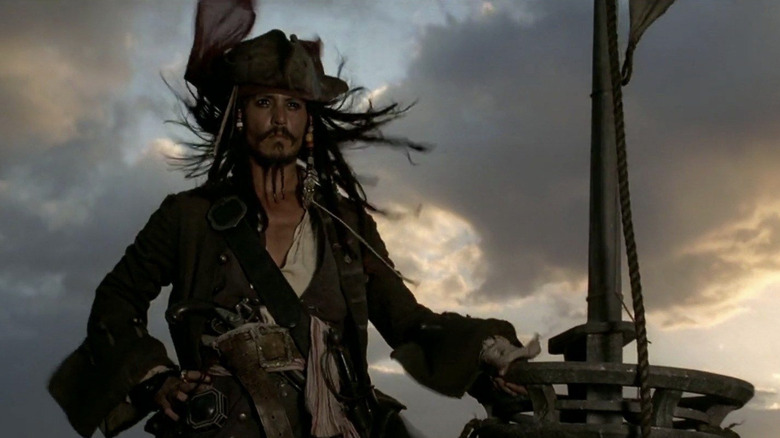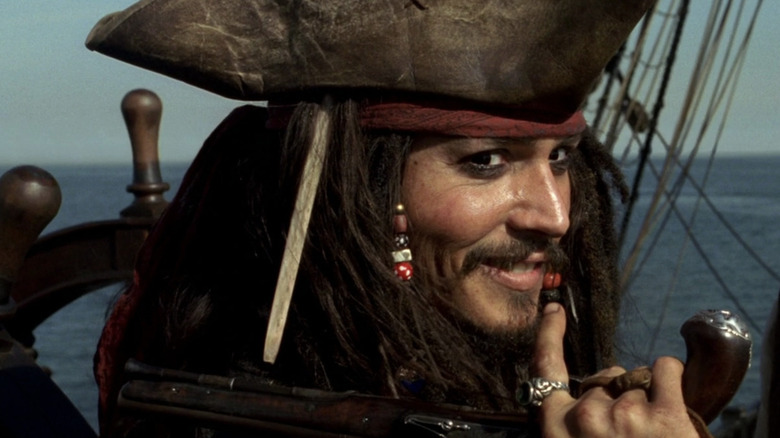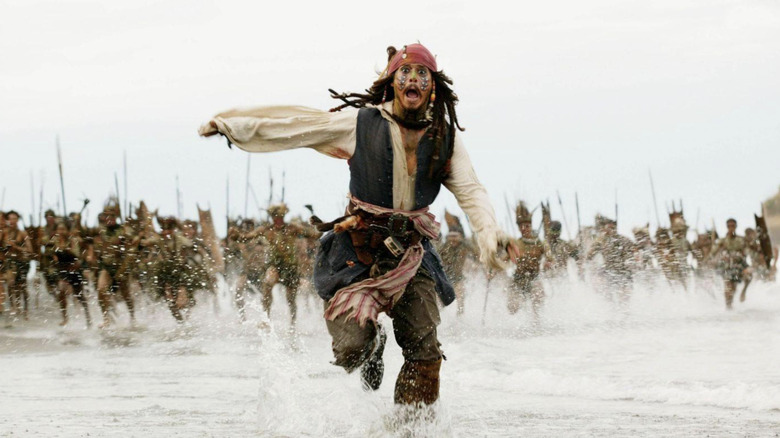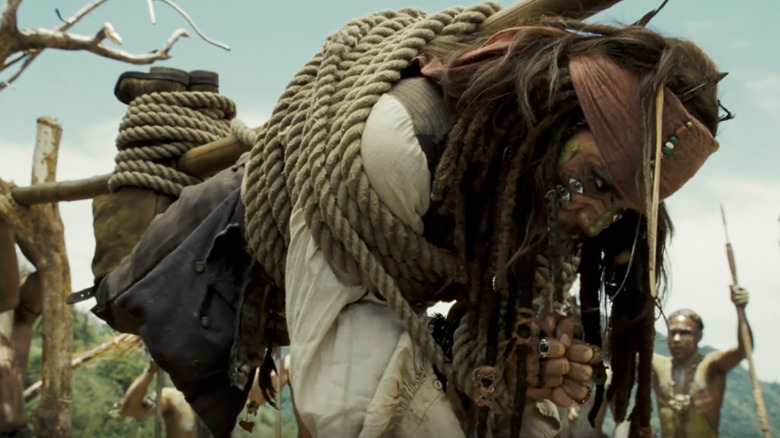Pirates Of The Caribbean Director Gore Verbinski Never Wanted To Make A 'Jack Sparrow Movie'
Johnny Depp broke into Hollywood by appearing in popular films like "Platoon," and "Nightmare on Elm Street," but he became a star in 1987 when he portrayed Officer Tom Hanson in "21 Jump Street." Uncomfortable with the idea of being a teen magazine pinup, Depp spent the next few decades accepting roles in films that were outside of the mainstream, like, "What's Eating Gilbert Grape," "The Ninth Gate," and "The Astronaut's Wife." Depp stepped back into the spotlight in 2003 when he accepted the role of Jack Sparrow in Disney's "Pirates of the Caribbean: The Curse of the Black Pearl."
In the beginning, Disney executives were skeptical about Depp's staggering, slurring portrayal of Sparrow, but audiences fell in love with the character. Eventually, his audacious and unpredictable behavior became the main focus of the films, but that is not what the original director ever intended. In a 2012 interview with IGN, director Gore Verbinski expressed his desire to make "The Pirates of the Caribbean" films more than just Jack Sparrow movies.
'A garlic milkshake'
Featuring zombie pirates, cursed gold, and an unexplored romance, "Pirates of the Caribbean: The Curse of the Black Pearl" is filled with entertaining images and storylines, and Jack Sparrow was a star right from the moment he staggered onto land from a sinking boat and bribed the dockmaster. In the beginning, the swashbuckler was an important member of the franchise crew, but he eventually became captain of the entire thing, which is something Gore Verbinski wanted to avoid.
Verbinski directed the first three "The Pirates of the Caribbean" films, back when the series still offered its audience fun and interesting adventures, and he never intended for Jack Sparrow to gain so much attention in the film series. When he spoke to IGN in 2012, he discussed his concerns about overwhelming the audience with the character:
"You don't want just the Jack Sparrow movie. It's like having a garlic milkshake. He's the spice and you need a lot of straight men... The studio pretty much clocked that right off the bat too. Let's not give them too much Jack. It's like too much desert or too much of a good thing."
Although the swagger and stagger of Jack Sparrow captured audiences' attention in the premiere film, Verbinski never totally relied on the "spice" of the character to carry the entire film, which is what makes the first three films of the franchise successful. Sure, a scene that focuses on the ridiculous antics of Sparrow is always a laugh, but Verbinski also made audiences care about Will, Elizabeth, and whatever life-threatening peril awaited them this go around. Verbinski knew how to pepper Sparrow's comic relief throughout the films in ways that benefited the franchise.
Unfortunately for "Pirates of the Caribbean," and its fans, Verbinski didn't return to direct the fourth or fifth film, and the balance he'd achieved between Sparrow and the rest of the cast was irrevocably disrupted.
Captain Jack's shoulders
With Verbinski at the helm, the franchise's earnings grew with every new film, but that changed after the release of "Pirates of the Caribbean: On Stranger Tides." After the director's departure, Disney decided to change their winning strategy by moving Sparrow from a side character to the star of the show. This attempt to capitalize on their audiences' affection for Sparrow backfired.
"Pirates of the Caribbean: On Stranger Tides" grossed $241 million, which is a significant decrease from the $309 million "Pirates of the Caribbean: At World's End" earned, and "Pirates of the Caribbean: Dead Men Tell No Tales" only brought in $172 million. These numbers show that Verbinski was right. Thrusting the sun-stroked pirate to the forefront of the movie instead of keeping him as comic relief resulted in fans quickly tiring of his repetitive antics and ridiculous struggles.
The last two films of the franchise got lazy and decided to rest the films on the teetering shoulders of Sparrow. Although audiences loved his charisma and wacky sense of humor when paired with fantastical stories of cursed coins and otherworldly adventures, it was unrealistic to expect an entire film to survive on accidental heroism, quick quips, and a wonky run.
Dead franchises tell no tales
In spite of the decreasing profits, Disney is planning to continue the film series, albeit without Jack Sparrow. Depp's role in the "Pirates of The Caribbean" has been on increasingly shaky ground since 2016, when his former wife, Amber Heard, accused him of physical abuse. He also lost a lawsuit against The Sun over the allegations, which did little to boost his reputation in Hollywood. In the last few years, Depp has experienced a huge fall from grace with Disney brass and the film industry at large. He dropped out of playing Grindelwald in the Harry Potter spin-off "Fantastic Beasts," and Disney announced that the Pirates franchise will move in a new direction. Jerry Bruckheimer recently revealed that a screenplay is in the works for "Pirates 6," but it seems unlikely that Depp will be a part of it.
For Sparrow fans, this is a bummer, but it might be a good thing for the franchise. Without Captain Jack, the series will no longer be able to rely on his charisma and humor, and will have to stand on its own two feet. It will be interesting to see if the franchise will regain its sea legs or continue to sink.



